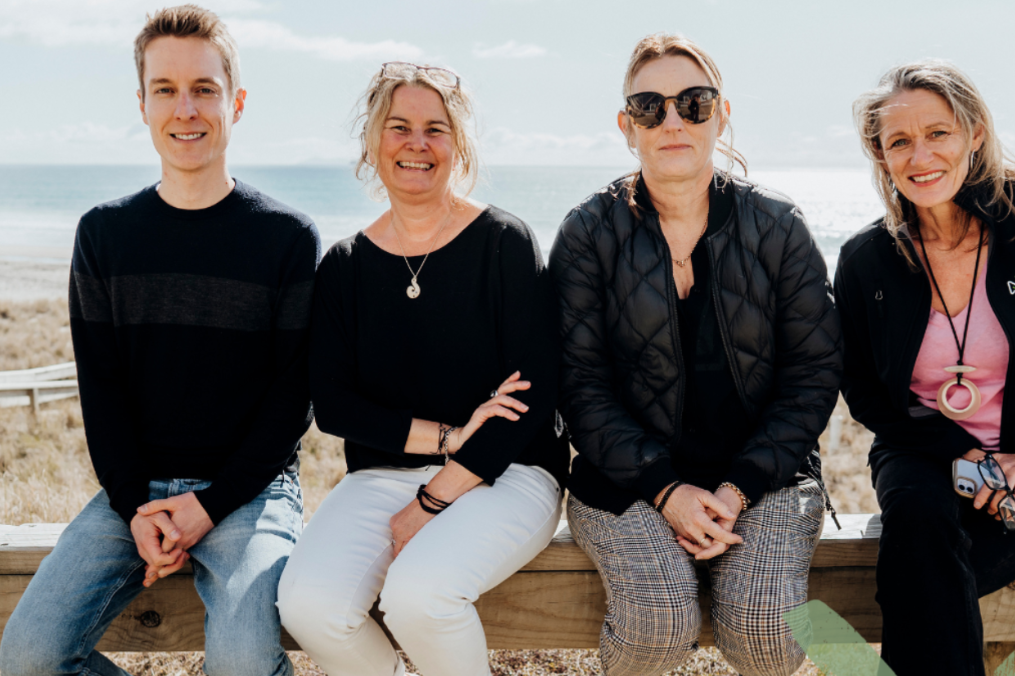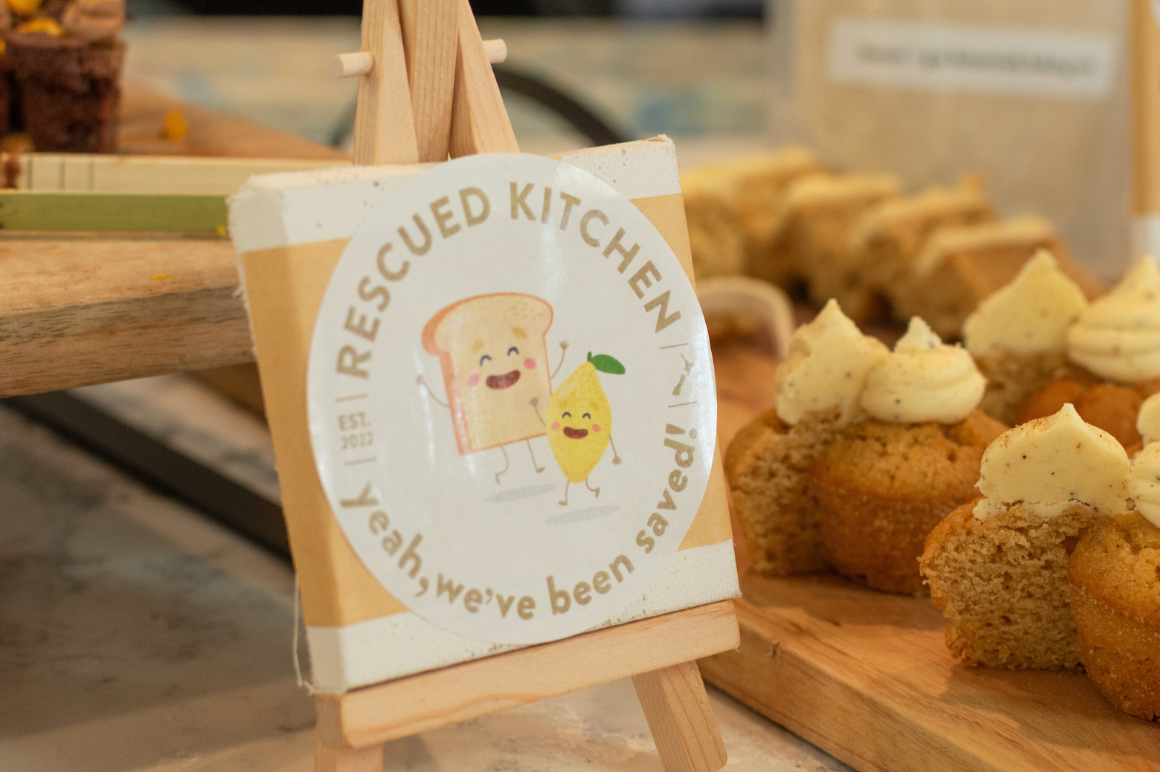We report on Upcycled United, a cross-industry team of innovators and leaders, sponsored by Climate Connect Aotearoa to take part in XLabs: Future of Food, a circular economy training programme for advancing a resilient and nature-positive future for our food industry.

From left: Marshall Bell (The Food Bowl), Diane Stanbra (Rescued Kitchen), Rhonda Clarkson (Bidfood), Sophie Percy (New Zealand Food Network).
In the article Upcycling: putting the ‘circular’ into our food economy we outlined the benefits of upcycling food – rescuing edible surplus produce from landfill and putting it to good use through food hubs, school programmes, new product lines and more.
On top of the social, environmental and economic wins, upcycling supports Te Tāruke-ā-Tāwhiri: Auckland’s Climate Plan. The plan lists food as one of its eight priorities because of its significant contribution to our gross emissions profile generated largely through land use, transportation and waste.
Our goals at Climate Connect Aotearoa involve identifying challenges in the key sectors, and then forging and supporting partnerships to develop scalable solutions.
One way in which Climate Connect Aotearoa is helping Tāmaki Makaurau Auckland evolve a more resilient and sustainable food economy has been through sponsoring the Upcycled United team to take part in the XLabs 2023: Future of Food programme.
Run annually, XLabs focuses on challenges and future possibilities in key sectors. As well as a self-directed three-month online learning course, the programme includes a ‘design sprint’ in which individuals or teams identify a challenge, design a prototype and pitch a circular opportunity. Many participating businesses have gone on to secure funding, internal resources and partners. In 2023, food was a particular focus topic.
New Zealand’s first circular economy lab
As New Zealand’s first circular economy lab in partnership with the Ministry for the Environment, XLabs has been helping businesses and communities explore new strategies and design products to advance ‘circularity’ in the economy: replacing current wasteful models of production with more resilient and nature-positive alternatives.
XLabs offers businesses the opportunity to build their capability to address many issues they face around procurement, supply chains and cost of goods; and addressing emissions generated. Noting the recommended actions set by New Zealand’s emissions reduction plan, Xlabs pivots challenges into tangible opportunities.
“The potential of New Zealand’s food industry and global leadership is boundless. We can transform the impact of our food, our industry and systems and global leadership, whilst also meeting consumer expectations and nutrition,” explains Louise Nash, CEO of Circularity, which delivers XLabs.
Rescuing food
One of those XLabs participants was Auckland-based Rescued. Its upcycled products include baking mixes, breadcrumbs and wraps (made from surplus bread), crackers (from spent grains), and pasta sauces and kasundi chutney (surplus tomatoes), which are sold through selected retail outlets; some are also delivered through school meal programmes in collaboration with business partners.
“I was introduced to XLabs in 2022 and it was a game-changer for Rescued,” relates founder Diane Stanbra. “We partnered with the New Zealand Food Network, The Food Bowl and Bidfood, and – thanks to Climate Connect Aotearoa – we came back in 2023 and launched our team, Upcycled United.”
United we stand
As well as Diane and her Head of Operations, Royce Bold, the team includes Gavin Findlay and Sophie Percy, CEO and Relationship Manager (respectively) of the New Zealand Food Network; Marshall Bell from the NZ Food Innovation Network; and Amie Clough and Rhonda Clarkson from Bidfood.
Collectively, Upcycled United spans almost all of the value chain.
Rescued is developing new products and building industry connections. As Diane explains, “a whole lot of R&D and food science” went into developing their baking mixes, which contain 100 per cent rescued bread flour – a world first. “As well as new products, we’re creating new jobs, and new business for our suppliers.”
With its open-access hubs offering equipment, technology and expertise, New Zealand Food Network helps businesses develop new products, taking them from tests and trials to scaled-up commercialisation and export.
Bidfood is a nationwide, full-service food wholesaler, with over 2200 staff delivering over 20,000 product lines.
The government-funded NZFN collects surplus produce (mainly from growers and supermarkets) and redistributes it to food hubs, soup kitchens, charities and institutions, helping families who can’t easily afford to buy food. We spoke to Gavin about recent work.
“At NZFN, we’re mostly redistributing food. With Upcycled United, we’re looking at a more circular approach, repurposing produce and giving it a longer shelf life or higher value – from food to nutraceutical to skincare products.”
He is keen to explore new opportunities. “There are so many untapped areas, whether it’s extracting pectin from dried citrus peel, or developing a national gleaning programme (like they have in Israel) to cope with gluts and storm windfalls. That’s what Upcycled United is all about: we have a clearer idea of the opportunities, and they’re significant.”

The path to a circular food system
Upcycled United’s aim is by 2027, Aotearoa will have a national upcycling system that can prevent 100 per cent of surplus food, from going direct to landfill, compost and animal feed. This is no small goal; how does the business plan achieve it?
First, it will leverage existing strengths, including:
-
networks (such as the Ellen MacArthur Foundation, Upcycled Food Association, Future Food-Tech, and government partners),
-
existing B2B and B2C channels to market (including Countdown and Bidfood),
-
proven success of early adopters (such as Montana Group, SkyCity and Eden Park),
-
products already proving their value – such as Rescued’s lines,
-
other XLabs participants, including Zespri.
Its evolving strategy is contingent on funding and infrastructure, and rests on a three-phased approach:
Phase one, scheduled to complete in March 2024, involves i) understanding the inputs and outputs, capabilities, capacity and channels; ii) developing partnerships for sourcing, manufacturing and infrastructure; and iii) a pilot stage to test the ‘system’.
Phase two will see i) the development of consistent commercial ingredients and products; ii) developing contract options for farmers, growers and fishers looking to create value-added products; and iii) further development or reformulation of products with a sustainable focus.
Phase three will see i) expanding product lines to house brands; ii) integrating product streams to create fully upcycled meals and products; iii) developing an agile, rapid product development model to respond quickly to markets; iv) an increased focus on branding and marketing for B2C channels; and v) full utilisation of by-products, and a zero-waste approach to operations (and products).
Collaboration and funding are key
While each stakeholder brings their own strengths, all agree on a collaborative approach in order to deliver better value. This had been made clear in January 2023 when The Food Bowl convened a cross-industry meeting to brainstorm circular food strategies, and participants noted the need, among other things, to
-
share information (on trends, data, case studies, recipes, etc.),
-
build B2B partnerships (e.g., for operating at scale),
-
advance advocacy and awareness, and
-
access funding.
In summing up, The Food Bowl called for ‘collective action’ to address challenges such as legislation, scaling of processing infrastructure, and investment; and for engaging the food service and packaging industry.
As Diane puts it: “Cross-sector collaboration is the route to a circular food economy. Investment will be the biggest accelerator for change.”
Essential, too, is a holistic approach in which circularity is designed into the system from the get-go. “We need mechanisms to capture outcomes from every part of the value chain, so that every output is either for consumption or reconstitution.” says Gavin.
Louise Nash emphasises: “We are currently very focused on waste, but we need to design our impact at the outset. Often people talk about a waste strategy – but we need a circular economy strategy, where you apply a design-led approach across your business from beginning to the end; that is where you start to see the real benefits gained. I’d like to see that become a key focus at a policy level with this new coalition government.”
Find out more
Click here to register your interest in Xlabs.
If you’d like to implement upcycling in your business, get in touch with our team for introductions to potential partners.